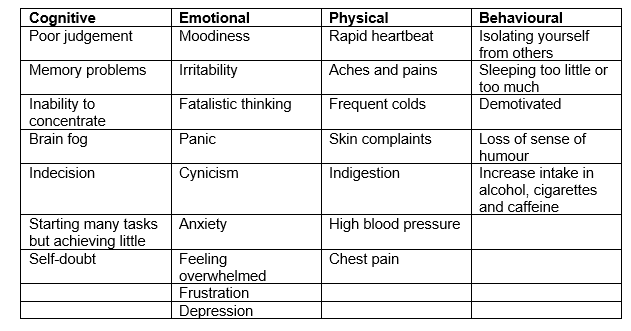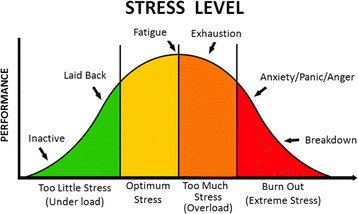National Stress Awareness Day
Wednesday 06 November 2019
Last updated: Wednesday 26 May 2021
We all know what stress feels like. It is our reaction to being placed in a situation or experiencing an event which puts pressure on us. Sometimes stress can be positive, known as eustress – it can make us more alert, attuned and can help us perform better in some situations. However, eustress is only beneficial in short-term situations.
Excessive or prolonged stress can lead to experiences of the following symptoms:
These symptoms can be experienced as a result of listening to the stress of others. To be repeatedly exposed to the traumatic experiences of another, through witnessing or hearing about traumatic events, can lead to secondary traumatic stress. This form of stress can start to have an impact on your own life, personally and professionally.

How to identify stress
 Identifying you’re feeling overwhelmed can be difficult; sometimes we are unable to acknowledge this until we are in ‘burnout’. It is therefore incredibly important to check-in with yourself on a regular basis. If you’re starting to feel pressures in areas of your life, take a look at reasons why you may be feeling that way. Sometimes simply identifying what may be going on for you is enough to help you adapt or change it, resulting in more positive and settling feelings. However, sometimes recognising stressors can allow us to identify that we need support. Line managers, colleagues, friends or family may be able to provide support, or signpost to more appropriate guidance.
Identifying you’re feeling overwhelmed can be difficult; sometimes we are unable to acknowledge this until we are in ‘burnout’. It is therefore incredibly important to check-in with yourself on a regular basis. If you’re starting to feel pressures in areas of your life, take a look at reasons why you may be feeling that way. Sometimes simply identifying what may be going on for you is enough to help you adapt or change it, resulting in more positive and settling feelings. However, sometimes recognising stressors can allow us to identify that we need support. Line managers, colleagues, friends or family may be able to provide support, or signpost to more appropriate guidance.
The Stress Management Society provide a free Individual Stress Test. Although not intended to be diagnostic, the output report generated provides hints and tips which are aimed to help you to take charge over aspects of your life.
For example: if you score below average on obtaining 7-9 hours of sleep 4 nights a week, one tip is to ‘finish your day quietly – try to wind down an hour or two before bed. Establish a bedtime routine that will relax you, like taking a bath or listening to some relaxing music’.
You can complete the test here: https://www.stress.org.uk/individual-stress-test/
How to Cope with Stress:
Although it is always useful to seek support from others, there are some things you can do to help yourself build up resiliency to stress. Resilience is your ability to recover from difficulties which could be having a mental, emotional or physical impact. Being able to self-regulate your emotions and develop resiliency can improve your general emotional well-being and help you to adapt in the face of challenges.
Below are some strategies you could use to be able to self-regulate your emotions and build upon resiliency:
- Relaxation techniques: Having a bath, listening to calming music and meditation are just some examples of activities which may be relaxing and gives yourself the opportunity to process and cope with stress.
- Exercise: Being physically active is a great way to reduce stress, even through small changes such as regularly walking outside.
- Eat healthily: What you eat and when you eat can have a huge impact on how you feel.
- Make time for the things you enjoy: Finding an activity, you love or making time for your family and friends can help you escape from the everyday stress.
- Forgive yourself: It’s okay to feel stressed by the stress experienced by other people, it doesn’t reflect upon your ability to care for them.
- Practise being straightforward and assertive: if people are making unreasonable demands on you, try and verbalise how you feel and learn to say ‘no’. Assertiveness is based on balance: it requires being honest about your wants and needs, while still considering the needs, wants and rights of others.
Sometimes we may feel that taking time for ourselves is selfish but even just spending half an hour relaxing, exercising or doing something that you enjoy can improve your well-being, making you more able to take care of the well-being of others.
Written by Katherine Anderson and Hannah Gilding.
